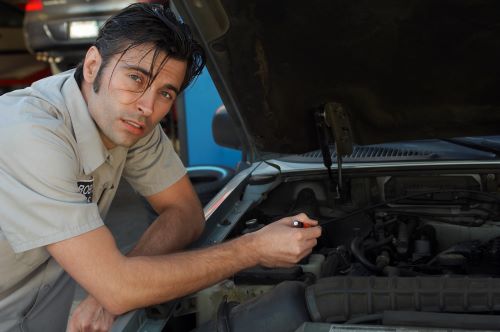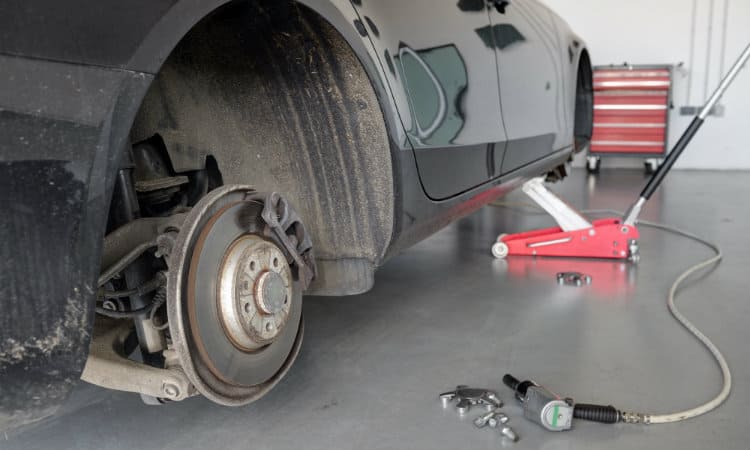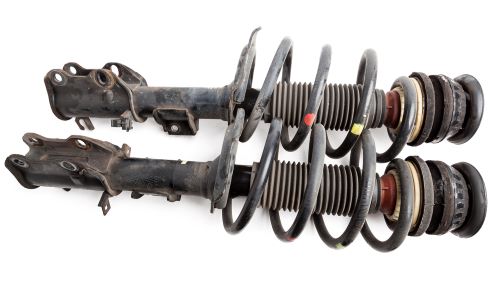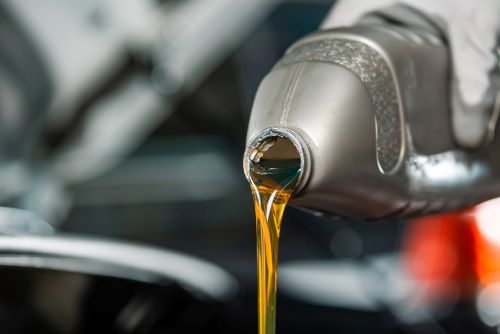Knocking noise coming from your vehicle is never a good thing–unless maybe the neighbor’s cat is caught in the belt. Usually, if you can hear the noise when you start the vehicle or when it is idling, the sound is coming from the motor. If you hear it while driving, the sound is likely from something other than the motor.
This list will touch on some of the more common causes along with some idea of what they sound like, and some possible cures.

Engine Knocking Noises
Most automobile knocking noises are generated by the motor. Or some of the parts hung off it. And almost always, they are serious and should be dealt with immediately, if not sooner.
Theoretically, engine knock is not as big a problem in newer vehicles because of air/fuel mixtures, injectors, and timing are all controlled by computers that feed information into the knock sensor. Which fixes the problem. Unless the knock sensor is faulty and is causing the knock.
Low Engine Oil
Low engine oil can cause engine knocking and engine damage. Low oil is usually caused by leakage, burning oil, or too little put in during an oil change. (My Hemi takes 7.5 liters of oil when empty. The oil change people have only put in 5 liters–twice. Check your oil levels.)
With any luck, bringing the oil level up to the mark will eliminate the knock. Unfortunately, by the time you hear engine knocking because of low oil, the damage has probably already started.
If the oil is low enough for long enough, the next knocking you may hear is a broken rod trying to pound a hole in the engine block.
Lack of lubrication can also cause a knocking or tapping sound from the upper engine. This is quite often valves or lifters not getting enough oil. For more information please see our article How to Quiet and Fix Noisy Lifters.
Detonation Knock
Detonation knock is caused by improper air/fuel mixtures. Which has the fuel burning in individual pockets instead of one uniform explosion. If the mixing problem is not fixed, you can expect piston and cylinder wall damage.
Three other causes of detonation knock could be:
- Low Octane Fuel. Using fuel with a lower octane rating can cause knocking. Higher octane rated fuel resists premature detonation. It is easy to solve this pre-ignition by using higher octane fuel that matches the vehicle’s recommended level. Or buying an octane booster.
- Carbon Deposits. Carbon build-up on valves, spark plugs, and even piston heads reduces the amount of volume inside the cylinder, increases compression, and can cause premature detonation and knocks. In most cases, adding an injector cleaner or carbon cleaner to the fuel tank will take care of the problem.
- Incorrect Spark Plugs or Plug Gap. This is usually a fairly easy and simple fix. Just pull out a plug or two, and check that they match manufacturers recommendations. You will also find the recommended spark plug gap in your owners manual. If you have a spark plug gapping tool, you can check and adjust the gaps as needed.
Loose Timing Chain
A loose timing chain can cause knocking, clattering, or rattling sounds from the front end of the motor. Quite often the cause is a stretched chain, or a failed guide or tensioner. The noise you hear may be a chain that is so loose, it is banging on the cover.
Timing chains control the timing and order of valves opening and closing. Timing chains that are off by even a few seconds can cause damage to valves or pistons because bad timing can add to detonation knock.
Timing chains should be repaired as soon as the problem is diagnosed. The longer it is left unattended, the more damage it could cause. If you are not comfortable taking this on yourself, take it to a shop. It can be a fairly expensive repair but nothing compared to valve and piston replacements.
Worn Valve Train
Valve trains–which include rocker arms, lifters, and camshafts–will make knocking or tapping noises when they get bad enough. The noise usually comes from the top of the engine. Besides normal wear and tear of metal parts interacting with each other at high speeds and temperatures, driving with low oil levels will wear out parts quicker.
Keeping the oil at the optimum level and changing it regularly will reduce valve train wear. For more information please see our articles How to Quiet and Fix Noisy Lifters and The Best Additive to Quiet Engine Noise of 2023.
Knocking–and Other–Noises When Idling
Quite often the best time to listen for engine knocking or any other strange noises is just after you start the vehicle. There is no road noise, no acceleration sounds from motor or exhaust. The engine is cold and most of the lubrication has drained back to the oil pan.
If you have a valve train issue, you will hear it on start-up. Along with detonation problems, and low oil problems. Any, or all, of those knocking and tapping sounds should show up early. If none of these are a terminal problem, they will disappear quickly–usually within a minute–making turning the radio off and listening to the motor instructive.
Along with hearing engine knocking noises, you could also hear knocking, scraping, grinding, howling, or other horror movie sounds coming from the front end of the motor. Where the alternator, air conditioner compressor, water pump, and belt tensioner are attached with bolts that can become loose, and rotate on bearings that can wear out.
Any one of these essential pieces of equipment can make knocking, scraping, grinding, howling, or screaming noises. If you think you hear something out of the ordinary start-up sounds, spend a little time with the hood open trying to isolate the noise. Even if you have no intention of trying to repair the problem yourself, giving the mechanic a hint of where to begin looking can be beneficial.
- Knocking can come from a seized or dry bearing. Also from loose bolts or nuts.
- Scraping can be a loose pulley rubbing against a metal housing.
- Grinding could also be a bearing problem. Or lack of lubrication somewhere.
- Howling could be a power steering pump that has an empty reservoir.
- Screaming is almost always a water pump that is about to pack it in.
For more information on alternators please see our article Alternator Noise–How to Diagnose and Fix and Power Steering Pump Noise–A Helpful Guide How to Diagnose and Fix.
Additional Engine Knocking Noises
- Knock or Clunk when Starting. If you hear a clunk or knocking sound when you turn the key to start the vehicle, you probably have a starter problem. With any luck, the electrical connections are loose and there is not enough power getting to the starter to engage the starter teeth. Without any luck, you will need to replace the starter motor–soon. This is a fairly easy DIY project as you can see from this YouTube video.
- Knocking when Accelerating. Quite often knocking noises become more apparent when you are accelerating. A noise that can’t be heard at idle can make itself known when the motor is under stress. This can be tracked back to lubrication also–placing more demand on the system.
- Exhaust Leak. Strange as it may seem, exhaust leaks can cause knocking or popping sounds–usually when you are decelerating. You can hear these noises because the system is no longer containing the sound made by the motor. If the hole is in your catalytic converter, it is going to be quite pricy to repair. For more information about exhaust systems please see our article How to Quiet a Loud Exhaust.
- Loose Heat Shield. Loose heat shields make loud knocking and rattling noises. Fortunately they are fairly easy and inexpensive to repair. Heat shields on your exhaust system can become loose because of broken or missing fasteners. Most original heat shields are made of high strength aluminum so when they get loose, they knock and rattle loudly. If you are replacing your heat shield, give some consideration to skipping the metal and using an exhaust wrap. Quicker, easier, way less expensive.
Non-Engine Knocking Noises
Not-engine knocking noises can come from almost anywhere. From a loose grille knocking against its broken mount to a loose tail pipe knocking against the bottom of the passenger cabin, and many parts and places in between.
Damaged Wheel Bearings
Worn or damaged wheel bearings will cause a knocking noise as the wheels are spinning. Bearings will wear down over time, but will deteriorate quicker if anything from moisture to a foreign substance gets into the race to deplete the bearing grease. Constant driving on rough roads will accelerate the wear.
Worn out wheel bearings cannot be repaired. They need to be replaced. Replacing a wheel bearing is not terribly complicated, but it is labor intensive and time consuming. Maybe not something a novice mechanic wants to tackle. The following YouTube video will help you decide if it is something you feel capable of taking on.
If you change one front wheel bearing, plan on changing both. And have the parts on hand before starting, because once the old bearing is off, the vehicle is not moving until the new one is on.
Brake Noises

Brake noise is not so much a knocking sound as a clunking sound. Whatever it sounds like to you, the sound does not mean anything good. Your knocking/clunking noise can be caused by many different things–a seized brake caliper, a very loose or damaged wheel bearing, even worn ball joints or damaged steering rack.
A seized caliper means your brakes are not working properly. A badly damaged wheel bearing could be bad enough that the wheel is flopping side to side on the spindle. Badly ball joints and/or steering components could be bad enough that your vehicle is dog tracking down the road.
Changing brake calipers is not very difficult and can be accomplished without specialized tools except a Disc Brake Caliper Tool Kit. Keep in mind that a bad caliper may have damaged your wheel rotor also. Before ordering just the caliper, remove the wheel and inspect the rotor also.
Before committing to changing wheel bearings, please take a look at the YouTube video above. It is quite a bit more complicated than brakes.
Vehicle Dog Tracking: Occurs when vehicle rear wheels do not follow front wheels in a straight line. In really bad cases, you can see all 4 wheels at the same time when following another vehicle.
Worn or Damaged Steering Rack
If your steering rack is bent or damaged in some way it could cause a knocking noise–which will become louder and more persistent when you accelerate or drive over bumpy roads. You may also feel that the steering is loose and not as responsive. Which means it may not be damaged–just wearing out and in need of replacement.
Steering racks are another of those “If you do not feel comfortable fixing it, then don’t.” items. Take it to a professional if you are not sure. Turning the steering wheel left and having the car continue straight may require a change of underwear. At best. Possibly much worse.
Damaged or Worn Out Suspension
 Two Worn Struts
Two Worn Struts
If you are hearing a knocking noise from under the vehicle when going over potholes or a bumpy road, it may be that your suspension requires attention. Leaking shocks that ‘bottom out’ likely need to be replaced soon.
If the looseness you feel in the steering is not the steering rack, it could be worn struts. Front struts are not only part of the vehicle’s suspension; but part of the steering also, and may need to be replaced. For more on struts please see our article How to Quiet Noisy Strut Mounts.
Note: Your suspension system is also part of your steering system and includes steering rack, ball joints, tie rod ends, anti-roll bars, and to some extent, wheels and brakes. Because of this integration, it is sometimes difficult to diagnose exactly what is causing your knocking. Even if you plan to fix it yourself, it might be a good plan to have a professional find the problem and tell you what to repair.
Additional Non-Engine Knocking Noises
Some of the other causes of knocking noises you hear while moving could be the following.
- Ice and/or Dirt Build-up. Dirt or ice building up in the wheel wells could possibly make contact with the wheels. If the build-up is thick and heavy enough, you will hear a grinding/banging/knocking noise every time you turn. Until the build-up is worn down, knocked off, or cleaned out. (Those of us who live where it snows a lot usually get into the ‘quick check’ habit early in life.)
- Loose or Worn Belt Tensioner. The serpentine belt on the front of you engine is kept tight by a belt tensioner. If that tensioner gets loose or is wearing out, it will make a knocking noise because it is not spinning smoothly. It may also squeak or squeal, and the belt could be loose. You may be able to tighten it, but likely you need a new tensioner. Unless the belt is new, you should buy a new one at the same time.
- Acceleration Noises – Non-Engine. Not only can you hear knocking from the motor when accelerating; you may hear noises from other parts of the vehicle. Such as a manual clutch, brakes, steering, or suspension. A clunking or knocking noise coming from under you seat could be a worn U-joint not keeping the drive shaft straight. (From experience, not only will U-joints make a lot of noise, they will also cause some ugly vibrations.)
Is It OK to Drive With a Knocking Noise?
Sometimes and maybe could be the answers to this question. But only if you are absolutely certain that you will not do more damage.
The safe answer is more likely a resounding “No.” Most people are not mechanically savvy enough to know what they are hearing. Although the vehicle will probably continue to move with a knocking noise–even a broken rod–there is a good chance you will cause more damage and incur more cost.
Driving with an engine knock will almost certainly cost you more in engine repairs. Driving with wheel, steering, or suspension knocks can be dangerous. For instance, knocking coming from the steering rack could be telling you that taking the next tight corner at speed may not work out well.
Preventive Maintenance

As you can see, many knocking noises are directly related to lubrication–or lack of lubrication. Changing oil regularly according to the manufacturers recommendations is essential for long motor life and fewer repairs. Good clean oil keeps everything running better and longer.
Your owners manual will probably also give you some tips on things you can check on. Although it is becoming more difficult to do anything to your vehicle yourself. But a few things like fluid levels and just looking under the hood for anything that might be different is a worthwhile habit to get into.
Personal Story: My 2005 Ram Hemi has 350,000 miles on it. No oil leaks. Does not burn oil. Almost all original parts. No ugly knocking sounds. I have changed oil about every 3200 miles for 17 years. Of course, it is a Dodge!
See a Mechanic
This is in no way a complete list. Knocking, banging, rattling sounds can be come from many other sources. Some can be fairly serious, like torque converter and flex plate issues. Some much less serious, like a large stone rattling around in the bumper.
If you are not certain what you are looking for, do not have the time or interest, or have better things to do, take your vehicle to a good repair shop. It should have the necessary experience and diagnostic equipment to track down the noise making culprit, and rectify the problem.
Note: Make sure you get a quote for the work before you tell them to go ahead. Surprises on your birthday are good. Surprise vehicle repair bills–not so much.
